|
Frequently Asked Questions
What makes ice cubes cloudy?
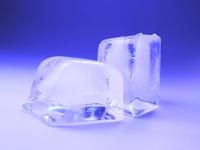 Commercially made ice is stirred as it is being frozen and household ice is not. Without mixing, many more ice crystals form and air is trapped in the ice. Light rays are distorted by these crystals and this distortion gives home frozen ice a cloudy appearance. Dissolved, naturally occurring minerals (calcium and magnesium) in the water also tend to settle out when the water freezes. Commercially made ice is stirred as it is being frozen and household ice is not. Without mixing, many more ice crystals form and air is trapped in the ice. Light rays are distorted by these crystals and this distortion gives home frozen ice a cloudy appearance. Dissolved, naturally occurring minerals (calcium and magnesium) in the water also tend to settle out when the water freezes.
[back to top]
What is the white ring on the inside of my coffeepot and how can I get rid of it?
Dissolved minerals (calcium and magnesium) in water are left behind when water evaporates or is heated.
These minerals are white and accumulate in teapots and coffeepots. These white minerals can also be
found on shower heads and glass shower doors.
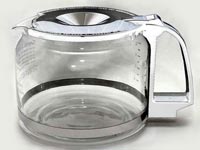 To remove these minerals,
fill the teapots and coffeepots with vinegar and let them sit overnight. Soak shower heads overnight in a plastic bowl filled
with vinegar. When you are done soaking, carefully discard the contents of the plastic bowl down the drain and flush the
container and sink drain with plenty of water. Rinse the teapots, coffeepots, or shower heads thoroughly after treatment and
before use. To remove these minerals,
fill the teapots and coffeepots with vinegar and let them sit overnight. Soak shower heads overnight in a plastic bowl filled
with vinegar. When you are done soaking, carefully discard the contents of the plastic bowl down the drain and flush the
container and sink drain with plenty of water. Rinse the teapots, coffeepots, or shower heads thoroughly after treatment and
before use.
White spots on glass shower doors are difficult to remove with vinegar because the spots dissolve very slowly. A better idea is to prevent the spots from forming by wiping the glass doors with a damp sponge or towel after each shower.
[back to top]
What is that smell in my water?
The three most common smells customers inquire about are:
Chlorine. A disinfectant which is added to the water to kill germs.Typically, between 0.8 ppm – 1.2 ppm of chlorine are added to the water to ensure there will be sufficient disinfectant to kill germs at the farthest point from the water treatment plants.
MIB (methylisoborneol)/Geosmin. Harmless by-products given off from algae in the lakes and canals. Thankfully, ICWD customers virtually never experience this.
Dirty drains. People commonly mistake smells coming from their drains as “smelly” water. To accurately determine if a smell is coming from your water fill a clean glass with cool water and walk away from the tap to smell it. Most of the time the smell will not be in the glass. Pouring bleach in the drain will kill germs that may be growing in the trap.
[back to top]
What is the pink or black stuff in my toilet and shower?
Usually, this pinkish film appears during and after new construction or remodeling activities. The dirt and dust stirred up from the work probably contains Serratia bacteria. Once airborne, the bacteria seek moist environments to proliferate. Some people have even noted the pink residue in their pet’s water bowl, which causes no apparent harm and can be easily cleaned off. Others have indicated that their experience with this nuisance occurs during a time of year that their windows are open for the majority of the day. These airborne bacteria can come from any number of naturally occurring sources, and the condition can be further aggravated if customers remove the chlorine from their water by way of an activated carbon filter.
The best solution to keep these surfaces free from the bacterial film is continual cleaning. A chlorinous compound is best, but use care with abrasives to avoid scratching the fixtures, which will make them even more susceptible to bacteria. Chlorine bleach can be periodically stiffed into the toilet tank and flushed into the bowl itself. As the tank refills, more bleach can be added. Three to five tablespoons of fresh bleach should be all that is necessary. A toilet cake that contains a disinfectant can keep residual in the water at all times. The porous walls of a toilet tank can harbor many opportunistic organisms.
Cleaning and flushing with chlorine will not necessarily eliminate the problem, but will help to control these bacteria. Keep bathtubs and sinks wiped down and dry to avoid this problem. Using a cleaning solution that contains chlorine will help curtail the onset of the bacteria.
While all water utilities are concerned about the quality of the product they are supplying to their customers, they cannot maintain water quality once it leaves the pressurized distribution system and enters the customer’s plumbing.
[back to top]
Why is my water pressure low?
If your water pressure suddenly drops to nothing or to a small trickle, please contact the ICWD at (864) 472-2858
or (828) 863-2295, any time of day, seven days a week.
If you have been experiencing low water pressure on an ongoing basis, check to see if the low pressure is only
noticeable in certain parts of the house or only from the hot or cold water. If the answer is yes, this would
indicate a problem with your home’s interior plumbing. You may need to contact a plumber.
If the low pressure is noticeable throughout the entire house and tends to drop when more than one faucet is
being used, this indicates a need for further investigation. Report these problems to our office at
864-472-2858 or 828-863-2295. This number is answered 24 hours a day, seven days a week.
[back to top]
Should I buy bottled water?
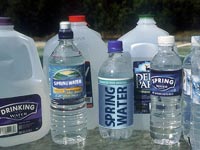 You don’t need to buy bottled water for health reasons. Our drinking water meets all of the federal and state drinking water standards. Many consumers purchase bottled water because of convenience. Of course, in emergencies bottled water can be a vital source of drinking water for people without water. You don’t need to buy bottled water for health reasons. Our drinking water meets all of the federal and state drinking water standards. Many consumers purchase bottled water because of convenience. Of course, in emergencies bottled water can be a vital source of drinking water for people without water.
[back to top]
How much will it cost me to get water service?
For the vast majority, it depends on two factors. The first factor is the meter size. Meters vary in size from ¾-inch to 8-inch and larger. The larger the meter, the higher the cost. The second factor is a function of whether or not the ICWD has participated in the cost of the water line. If the ICWD did not participate in the cost of the water line in any way, the cost of the service connection for the desired meter size is all that’s required. If the ICWD did share in the cost of the water line a Participation Fee will also be charged in addition to the cost of the service connection. The ICWD current tap prices are available on this website under the RATES-RULES-REGS tab at top of page.
[back to top]
How will you know where to put my meter?
Once you have fully paid your tap & meter fee you will receive a flag to place near the road where you would like your meter located. We will make every effort to accommodate your desired placement.
[back to top]
How long does it take to get the meter installed?
With a normal workload the ICWD installs most taps in 3 weeks or less.
[back to top]
Do I own the meter after it’s installed on my property?
No, the meter and meter box remain the property of the Inman-Campobello Water District. The customer is responsible for all plumbing from the back of the meter box to the residence.
[back to top]
Will my yard be repaired once the service connection has been installed?
Yes, the ICWD will make every effort to restore your property to its original condition or better.
[back to top]
My well works fine. Do I have to tap on to the water line?
No. You are under no obligation to connect to public water.
[back to top]
Does the ICWD run the water service line to my house?
No, the ICWD is responsible for the water line up to, and including, the meter. You will be responsible for having the service line connected from the meter to your residence.
[back to top]
Can you recommend someone to install the service line to my house?
It is the policy of the ICWD not to recommend contractors or plumbers. You should be able to find a plumber via the internet or you may want to ask friends and family if there is anyone they can recommend.
[back to top]
How high will my pressure be?
This varies by location. Water pressure is calculated based on the ground elevation of your residence and several other factors. South Carolina state regulations require that customers have a minimum of 25 psi at the meter but it is usually much higher.
[back to top]
How much will I pay each month for water?
The minimum monthly bill for a residential customer with
a ¾" meter is $20.16, which includes up to the first 2,000 gallons of usage. Consumption used above
the 2,000 gallons will be charged $4.25 per $1,000 gallons. A typical family uses approximately
6,000 gallons per month. This would result in a monthly bill of $37.16.
Visit http://www.icwd.org/rrr_rates.html for our current rate schedule.
[back to top]
How often do you bill?
Bills are mailed on a monthly basis.
[back to top]
How long do I have to pay my bill?
Payment is due 20 days from the date of billing. On the 21st day a late fee is added to your balance if the bill has not been paid.
On the 26th day a $30 non-payment fee is added to your balance and the water service is turned off until the balance,
including the $30 fee, is paid in full.
[back to top]
Where can I pay my bill?
Payments can be made by mail, in person at our office at 5 Prospect Street, Inman, SC; on our website at
www.icwd.org; or on the ICWD 24-hour automated phone service at 888-445-5991 (toll-free).
[back to top]
Can I pay with my credit card/debit card?
Yes. ICWD offers several payment options using a Visa or MasterCard.
You can make your payment online at www.icwd.org,
in person at the ICWD office, or by calling the ICWD 24-hour automated phone service
at 888-445-5991 (toll free).
[back to top]
Do you have an Equal Payment Plan?
No, not at this time. If you do not use much water for irrigation your bill will not vary greatly.
[back to top]
Can I have my bill drafted from my checking account?
Yes, you simply need to complete a bank draft form and provide us with a voided check.
If your account is on bank draft you should plan on your account being drafted twenty (20)
days from the date of billing.
[back to top]
Will I get a credit on my bill if I have a leak?
Once we have verified that the leak has been repaired you may be eligible for a partial adjustment if your consumption doubled during the billing cycle.
[back to top]
Is there someone on call after business hours for help?
Yes, just call (864) 472-2858 or (828) 863-2295 and press option 4.
[back to top]
What do I do with my existing well?
Wells must be disconnected from your plumbing once you begin receiving service from the ICWD.
You may continue using your well for irrigation, other outdoor related watering, or even drinking
water as long as the well plumbing is not connected to the same plumbing as your new service.
This is necessary by regulations in order to ensure that well water does not mix with the public water supply.
[back to top]
Do I need to have my water tested like I do at times with my well?
No. The BRWA and ICWD adhere to strict government standards which regulate the
quality of drinking water. The water has been filtered and treated in order
to remove harmful contaminants.
[back to top]
If the power goes out will I still have water?
Yes. Unlike with a well, your water service will not be disrupted due to a power outage.
[back to top] [Pay Online]
|


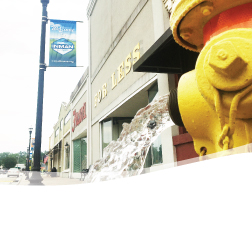
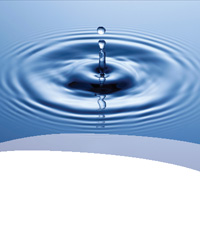
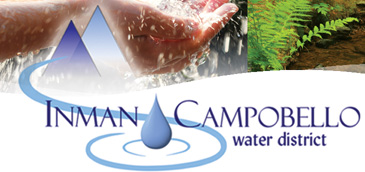
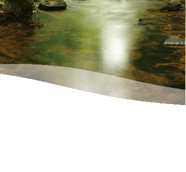
 Commercially made ice is stirred as it is being frozen and household ice is not. Without mixing, many more ice crystals form and air is trapped in the ice. Light rays are distorted by these crystals and this distortion gives home frozen ice a cloudy appearance. Dissolved, naturally occurring minerals (calcium and magnesium) in the water also tend to settle out when the water freezes.
Commercially made ice is stirred as it is being frozen and household ice is not. Without mixing, many more ice crystals form and air is trapped in the ice. Light rays are distorted by these crystals and this distortion gives home frozen ice a cloudy appearance. Dissolved, naturally occurring minerals (calcium and magnesium) in the water also tend to settle out when the water freezes.  To remove these minerals,
fill the teapots and coffeepots with vinegar and let them sit overnight. Soak shower heads overnight in a plastic bowl filled
with vinegar. When you are done soaking, carefully discard the contents of the plastic bowl down the drain and flush the
container and sink drain with plenty of water. Rinse the teapots, coffeepots, or shower heads thoroughly after treatment and
before use.
To remove these minerals,
fill the teapots and coffeepots with vinegar and let them sit overnight. Soak shower heads overnight in a plastic bowl filled
with vinegar. When you are done soaking, carefully discard the contents of the plastic bowl down the drain and flush the
container and sink drain with plenty of water. Rinse the teapots, coffeepots, or shower heads thoroughly after treatment and
before use. You don’t need to buy bottled water for health reasons. Our drinking water meets all of the federal and state drinking water standards. Many consumers purchase bottled water because of convenience. Of course, in emergencies bottled water can be a vital source of drinking water for people without water.
You don’t need to buy bottled water for health reasons. Our drinking water meets all of the federal and state drinking water standards. Many consumers purchase bottled water because of convenience. Of course, in emergencies bottled water can be a vital source of drinking water for people without water.